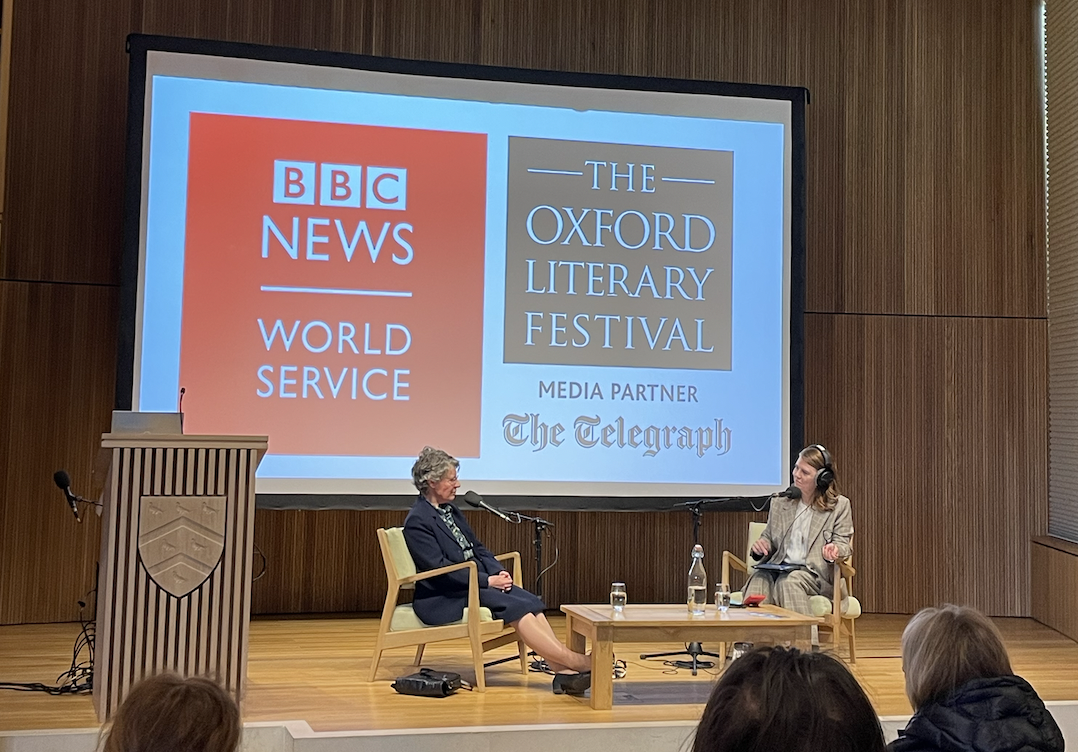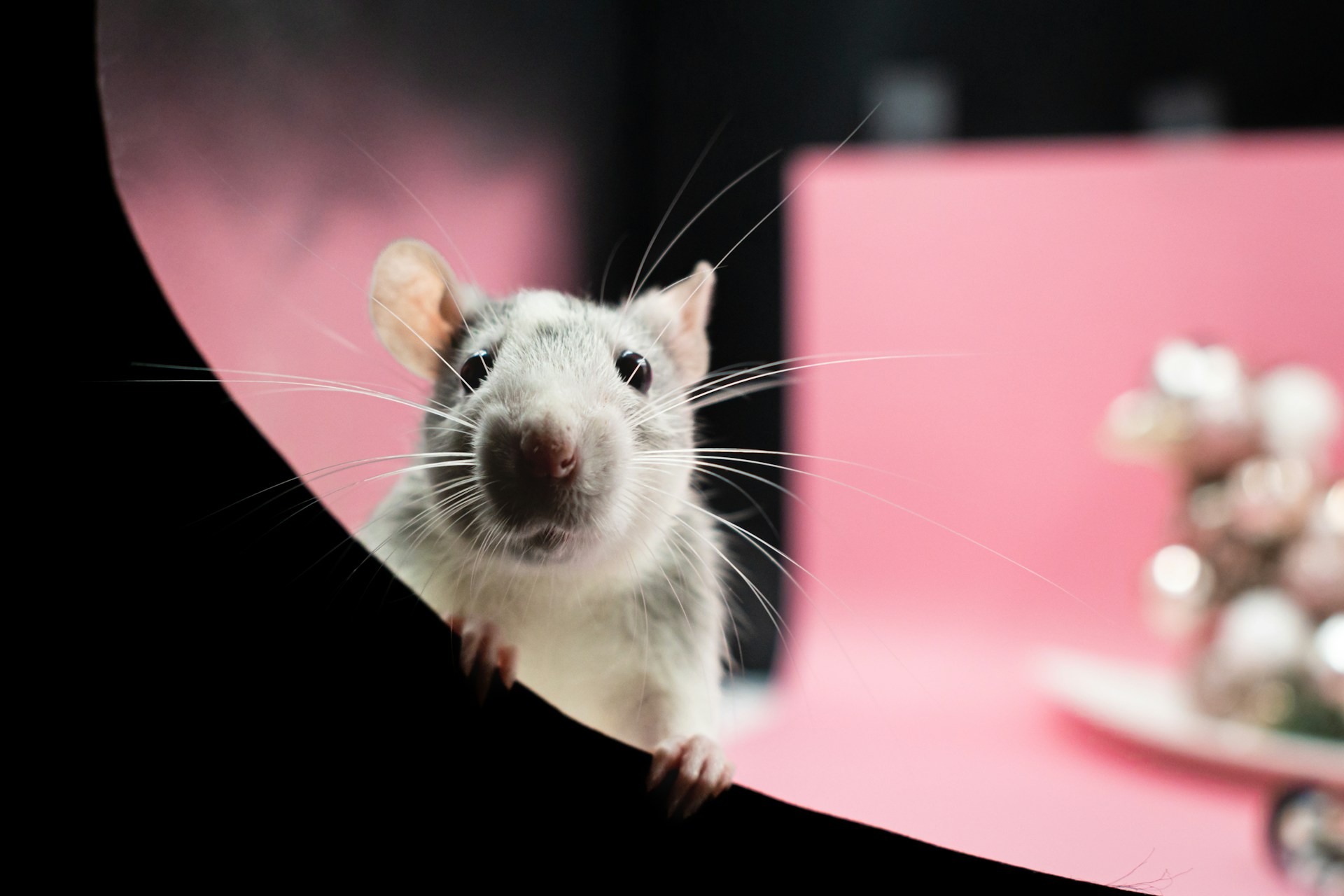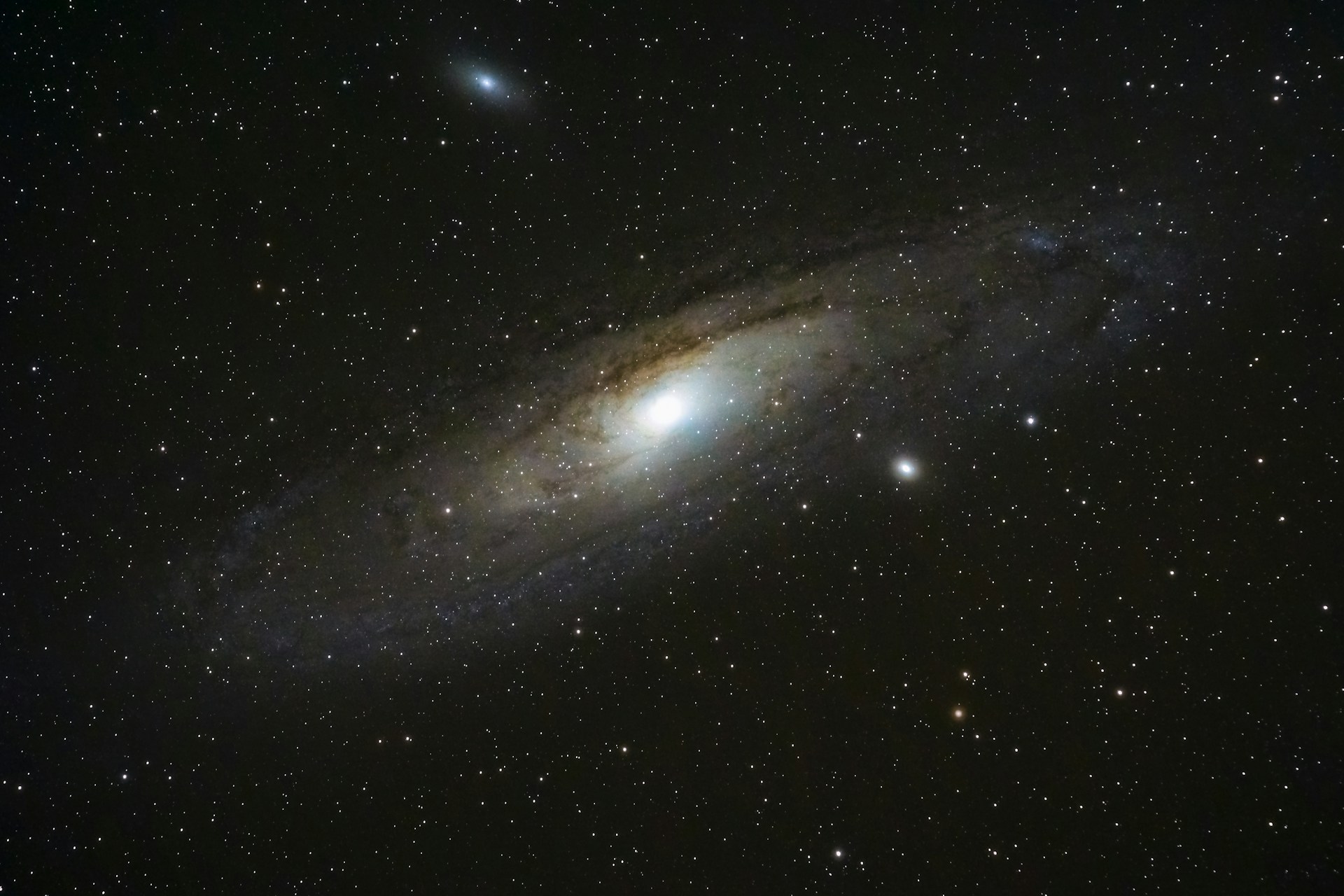Bell Burnell discusses the gender inequality she has faced throughout her career. Photo credit: Olivia Allen, The Oxford Scientist
‘How did it feel when the Nobel Prize was awarded to Tony and not you?’ Nuala McGovern asked Dame Professor Jocelyn Bell Burnell. ‘I was proud’, she replied. Proud that her discovery had earned the field of astrophysics its first Nobel Prize. Not upset or angry about the prize not going to her, the woman who made the discovery, but to two of her male colleagues. Instead, she chose to show a truly selfless love for the science, instead she chose to be proud.
In March 2024, Bell Burnell, a professor of astrophysics at Oxford who, in 1967, discovered a new type of star known as the pulsar, spoke to journalist Nuala McGovern at the Oxford Literary Festival about her life story and struggles as a woman in science. The event, held in Worcester college, was part of a live recording for the Forward Thinking series on the BBC World Service which aired on April 6. The discovery of the pulsar earned a Nobel Prize in physics in 1974 but it was not awarded to Bell Burnell herself. Instead, it went to Antony Hewish and Sir Martin Ryle, two of her male colleagues. Although she was proud that her discovery earned a Nobel prize, Bell Burnell began to challenge the injustice that not just she, but countless other women in physics face. She has since spent 50 years campaigning for greater access and acknowledgement for women in science, notably donating all of her £2.3 million dollar prize money from the Special Breakthrough Prize in Physics she was awarded in 2018 towards helping underrepresented groups become physicists.
Growing up in Northern Ireland in the 1950s, Bell Burnell recounted how she met gender discrimination in academia from a young age. Initially failing the 11+ exam, a public exam sat in Britain to determine what secondary school a student would attend, she explained how she later found out that the pass mark for the exam at the time was higher for girls than it was for boys. A fact that was met with laughs of disbelief form the audience. A different pass mark for boys and girls would be seen as completely unacceptable today. It is true that whilst issues such as gendering toys, where young boys are encouraged to play with building kits and young girls to play with dolls, was an issue brought up by both the audience and Bell Burnell herself, we have come a long way in equality in primary education since the 50s.
In 2023, the difference between the number of girls and boys sitting GCSE physics was minor. However, the gap began to widen the further through education a student gets, with only 23% of 2023 A-level physics candidates being female. This number stays similar when it gets to undergraduate level, today only 24% of physics undergraduates in the UK identify as female. This gender gap percolates through stages of education meaning that the women who make it all the way to astrophysics research number far fewer than their male counterparts, with only around 20% of astronomy papers published in 2021 being written by a female-identifying first author. Bell Burnell acknowledged the steps that have been and are being made in this area saying that ‘today, no woman would find themselves the only female in the class’. Financial rewards and funding opportunities have helped to pave the way in this regard. The Athena Swan scheme, which Bell Burnell helped to found, works on the basis that universities can get a financial reward if they demonstrate that they are actively trying to get more women into their physics departments. In her words, “money talks” and the scheme has proven to be quite successful with 1010 awards being given out to universities and research institutes for reaching various levels of gender equality.
A differing anatomy should not stand in the way of great female minds and women should not have to physically suppress their bodily functions to fit into a system designed for men.
But schemes like this were not around during Bell Burnell’s career. Moving to Glasgow to study for a Bachelor of Science, she explained how she actually found herself struggling to get to grips with physics whilst easily achieving top of the class in geology. But when she went to talk to the geology professor about pursuing geology further, he instantly turned her away. Women should not study geology, he said. According to him, there was no place for women in the jungles of Burma where geologists carried out their work looking for oil. Although it is no longer the case today that women cannot be geologists, or that all geologists carry out their work in the jungles of Burma, denying women opportunities due to a lack of facilities is still common. Waste disposal systems on the US side of International Space Station (ISS) are not designed to handle menstrual blood, and Bell Burnell recounted stories of women being prevented from working overnight shifts on observation telescopes due to a lack of female bathrooms. Women, however, have begun to overcome this. Contraceptive pills have allowed women on the ISS to skip periods altogether, and female bathrooms have been installed at telescope facilities. But it is stories like this that inspired Bell Burnell to advocate for women to have better access to science. A differing anatomy should not stand in the way of great female minds and women should not have to physically suppress their bodily functions to fit into a system designed for men.
After graduating, Bell Burnell moved to Cambridge in 1967 as a PhD student which she described as being ‘full of brash, Boris-like young men who spent their time debating what Pliny said or didn’t say’. Having spent her childhood in Northern Ireland, she said that Cambridge felt like a foreign world to her. But the one thing it had in common with Glasgow was the lack of presence of women in academia. Attending an all-women’s college in Cambridge she described feeling under enormous pressure to behave perfectly. Imposter syndrome, the feeling that you aren’t good enough to belong, was rife amongst the women of Cambridge, a constant feeling that the men might turn round and throw them out. Bell Burnell combatted this by deciding to work as hard as she could. Then, if they eventually did kick her out, which they did not, she wouldn’t feel guilty for the time she spent there.
This feeling of imposter syndrome is common in the world of academia. An audience member at the event asked if being in an all-female college helped this. Bell Burnell said that having that sense of camaraderie between the women was lovely to come back to after a day in the lab surrounded by men. In this way, encouraging not just women but people from other underrepresented backgrounds into physics can help more people feel like they belong. Bringing diversity into the sciences can help bring a whole range of perspectives, experiences, and ways thinking that can shape the science and research, bringing it in new directions, and leading to new discoveries, like the pulsar. As Bell Burnell says herself, diversity helps creativity.
During her time in Cambridge, Bell Burnell described her work as consisting of gathering data that was recorded on a paper chart, several miles long. Amongst this lengthy strip of data, she noticed a tiny signal, a quarter of an inch long, that would go on to be identified as a pulsar star. The signal was so tiny, spotting it was like noticing a needle in a haystack. After bringing this strange signal to her boss, she was initially dismissed and told it was human interference. Later, she got the signal verified by researchers at a different telescope and the pulsar star was identified. ‘It was scary because this kind of thing isn’t normally left to a grad student’ she told McGovern. When asked whether she meant, not left to a grad student or not left to a female grad student, she replied that in this case, it was not the fact that she was female but her lack of experience in the field that was causing the imposter syndrome. However, the majority, if not all, of the supervisors and senior positions at the time were held by men. Bell Burnell stated that she has spent much of her career as one of the very few, and usually the most senior, women in her departments.
It goes without saying that Bell Burnell was robbed of a Nobel prize, the first of its kind in her field. 225 people have won the Nobel Prize in Physics. Five of these scientists were women. None of them were black. There is a long way to go in getting diversity in the field of space science and physics as a whole. We are beginning to see the rise of women to more prestigious levels. Women are leading major telescope projects, becoming senior academics, and winning Nobel prizes. The 2023 Physics Nobel Prize went to Anne L’Huillier along with two of her male colleagues for experimental methods in attosecond physics. But the fact that this is remarked upon means that it has not yet become normalised. In the words of Bell Burnell, ‘we will know gender equality has been reached when there are equal men and women in the workplace, equal men and women in senior roles, and some of them parents of young children.’
[Bell Brunell hopes] that one day soon the field of space research will achieve true gender equality, which will pave the way for many great discoveries, and proper recognition for the scientists who discovered them.
Events such as this one, shedding light on the experience of the women in physics and what is being done to help even out the gender imbalance, are a step in the right direction and are helping to get recognition to the fact that gender diversity needs to be addressed in these fields. However, it could be said they are “preaching to the converted”. Looking around the room, most of the audience members were women, those who look up to pioneers such as Bell Burnell, those who are already aware of the problems. Having the discussion aired on the BBC World Service will reach a wider audience. But even so, the people engaging with media exposing the inequality tend to be the people already aware of the problem. Tackling the issue comes from deep down, from projects such as Bell Burnell’s Athena Swan. From engaging more women in science at a young age, encouraging and allowing them to speak and be heard. It is no longer the case that girls are trained to blindly agree with men as they were when Bell Burnell was entering the world of physics. A number of young women in research shared their stories at the end of Bell Burnell’s talk. An atmosphere of support and recognition of the struggle filled the room. There is a lot of work to be done but it is true we have come a long way since 1974, not just with the science but with the people doing the research. Bell Burnell is proud of her discovery, and proud of the Nobel Prize that went with it; even if it was not awarded to her. She hopes, along with the rest of the room, that one day soon the field of space research will achieve true gender equality, which will pave the way for many great discoveries, and proper recognition for the scientists who discovered them.





